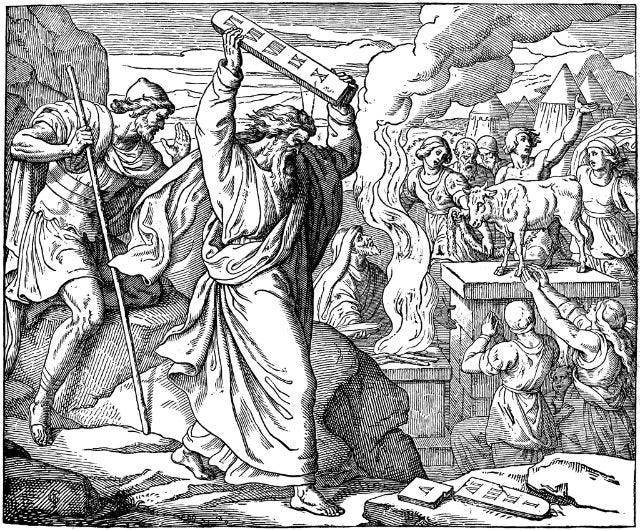The 9 Commandments
Authority
This article is not about contrasting religions or belief systems per se; the article compares the authority or the basis for two belief systems. And that origin is what produces different results and what is ultimately believed.
Roman Catholicism has as the "basis" of its belief system Church Tradition and the Bible. And according to the Second Vatican Council’s document on Divine Revelation, Dei Verbum (Latin: “The Word of God”), "both sacred Tradition and sacred Scripture are to be accepted and venerated with the same devotion and reverence.”
Biblical Christianity has as the "basis" of its belief system the Bible or sola Scriptura (Latin: "By Scripture Alone"). Biblical Christians believe Scripture alone is sufficient to save, sanctify and glorify. Romans 10:17 states, "So faith comes from hearing, and hearing by the word of Christ;" salvation. John 17:17 states, "Sanctify them by the truth; Thy Word is truth;" sanctification. Finally, John 5:24 "...whoever hears my word and believes Him who sent me has eternal life and will not be condemned; he has crossed over from death to life;" and that's full maturity or glorification.
Virtually the Same Scripture
The Roman Catholic and Biblical Christian Bibles are virtually identical outside of a few additional Old Testaments books in the Roman Catholic version.
Of course, there are minor variations. One version might state, "foundation of the world..." While another may state, "creation of the world..." However, these differences also exist within the various versions of the Bibles accepted both in Biblical Christianity and Roman Catholicism.
Scriptural Example
So with the same Bibles, how do we end up with different beliefs? Let's analyze an example.
In the Old Testament, Deuteronomy 5:6-21 and Exodus 20:2-17 each record the Ten Commandments. Leviticus 19 also recites the commandments but in more of a narrative fashion.
Now we know that there are precisely ten commandments because Exodus 34:28 declares, "...he wrote on the tablets the words of the covenant, the Ten Commandments."
Exodus 20:2 begins, "I am the Lord your God...You shall have no other gods before me." Of course, that's accepted by everyone as the First Commandment.
But then things change.
Exodus 20:3-8 continues, "You shall have no other gods before me. You shall not make for yourself a carved image, or any likeness of anything that is in heaven above, or...the earth beneath, or that is in the water...you shall not bow down to them for I the Lord your God am a jealous God... ."
These verses don't get included in the Roman Catholic's list of the ten commandments. They're in all the Roman Catholic Bibles but not in their Catechism. To arrive at the ten commandments, the last commandment is split between not coveting your neighbor's wife and not coveting your neighbor's property; the ninth and tenth commandments.
Since the missing verses are sequential, what has happened? Is Exodus 20:3-8 one of the Ten Commandments, a further explanation of the Exodus 20:2 first commandment, or just some extraneous text that should be discarded?
What is the justification? Well, as one Roman Catholic apologist states, "the Catholic Church alone has the authority to give to God’s people an authoritative list of the Ten Commandments."
Okay, but I thought Second Vatican found that Tradition and the Scriptures were equal.
Is that not the point, then? They can't be equal, and recognizing that is critical to understanding what one believes and why.
In Biblical Christianity, the Bible is primary. In Roman Catholicism, Church Tradition is primary.
New Testament Commandments
The New Testament makes the commandments much more straightforward...
Matthew 22:37-40 records the New Testament version of the Ten Commandments as follows: "You shall love the Lord your God with all your heart and with all your soul and with all your mind. This is the great and first commandment. And a second is like it; You shall love your neighbor as yourself. On these two commandments depend all the Law and the Prophets." (The Law and the Prophets are the Ten Commandments and the Old Testament.)
...but not necessarily easier.
And what is love? John 14:15 gives us that answer, "If you love Me, you will keep My commandments."
This then begs the question, which ones?
PS…If you enjoy “The Inevitable Truth,” will you take 6 seconds to refer this edition to a friend? It will go a long way toward helping me grow this newsletter (and share more Biblical truths).
Also, if you value this content, please consider subscribing and supporting it. This will allow me to continue offering the highest-quality posts each week.
Go here to read more articles in this mini-series.
Finally, I’d love your input on how I could make “The Inevitable Truth” even more useful to you! Please leave a comment with:
Ideas and questions you’d like covered in future editions
Your biggest takeaway from this edition
I read every single one of them!
Thank you!






